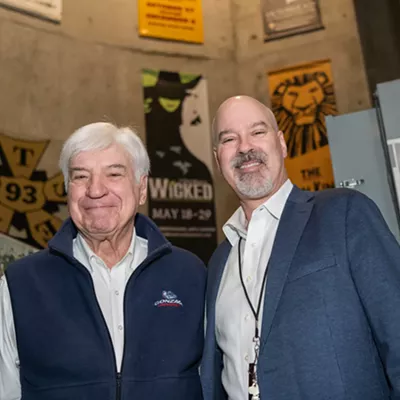When the little-known Spokane attorney George Nethercutt toppled Speaker of the House Tom Foley in 1994, he chiseled his name in American history. It also may have marked the beginning of the era of scorched-earth politics we still live in today, as it was Newt Gingrich and his Republican Revolution that powered the upset. Nethercutt, who later in life was critical of such politics, died at 79 on June 14.
After a decade in Congress, in 2004 the 5th District Republican representative ran unsuccessfully against Patty Murray for a Washington U.S. Senate seat. He then returned to private life, creating the George Nethercutt Foundation, which funded Nethercutt Fellows and encouraged college students to learn more about civics, government and history, "so that they deeply understand America's great story," Nethercutt once wrote.
"Only by studying from and appreciating the past," he added, "can young people prepare adequately for the future."
He also wrote two books: In Tune With America: Our History in Song (2010), and Saving Patriotism (2022). In 2010, after many years as a subject of Inlander news coverage, Nethercutt agreed to write a regular column that ran for nearly a decade. (You can find them at inlander.com/author/george-nethercutt.)
In his first Inlander column in March 2010, he talked about the message he would like to share:
"Readers of this column will be afforded a perspective deeper than those given in 30-second sound bites on television news," he wrote. "It will be a perspective borne of the knowledge all Americans should have of our founding principles, enhanced by the insights and perspectives formed by my 10 years of congressional service. I hope that reading this column will be educational and enlightening — because our nation is blessed by the toil and sacrifice of thousands, just like us, who built it, through all of its challenges."
As the years went on, he was able to hit on many topics of national urgency, from the intractable nature of the immigration debate to the seriousness of the national debt to the disconnect between young people and their leaders in Congress. In May 2014, he offered this critique:
"For starters, the quality of congressional leaders needs improvement," he wrote. "Leaders should be elected to serve the public good, not personal ambitions. Millennials want to believe in a candidate's goodness, large purposes and credibility. Public confidence can be restored if elected officials put the public interest first, with actions that demonstrate their sacrifice for public benefit. Young voters want public interest to rank above political self-interest. They want tangible results to show for their political involvement."
Then, in October 2017, he argued for a return to a kind of accommodation, if not outright bipartisanship, within the institution he knew well — after all, he'd served on the powerful House Appropriations Committee.
"...frustration has arisen in American politics, a frustration with both Democrats and Republicans, who seem to talk about important public issues but aren't able to act upon them," he wrote. "There's also an intolerance, both in Congress and out, that says, 'If you don't agree with me politically, I don't like you anymore.'
"Americans seem more polarized than ever, and that's bad for the U.S. — a place where compromise and working out differences have been hallmarks of democracy."
In one of his last pieces in July 2020, just a few months before the bitter Biden-Trump election, he pulled on that thread even more, contemplating how different views of progress and patriotism must coexist.
"Even as we navigate these dark times in the United States and globally, all Americans should take time to recall America's history and appreciate the tough times previous generations have endured, as well as the successes we have celebrated.
"Civility is defined as politeness in speech or behavior. Patriotism may be defined as devotion to and vigorous support for one's country. It's important to remember during these unprecedented times that we can together love our country without disparaging one another and being impolite."
I covered candidate Nethercutt back in that whirlwind of 1994; we worked together from 2010-20 to deliver his wisdom to readers. The lessons learned on his own remarkable journey can still inspire those who are looking to embrace a different brand of public life. ♦
Ted S. McGregor Jr. is publisher of the Inlander.


























